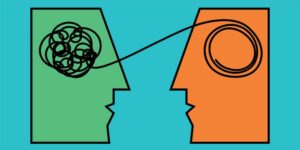Depression is a complex and debilitating mental health condition that affects millions of people worldwide. While there are various treatment options available, Dialectical Behavior Therapy (DBT) has emerged as an effective approach, particularly for individuals struggling with recurrent thoughts of self-harm, suicidal ideation, and emotional instability. In this blog, we will explore the fundamentals of DBT for depression, its components, and how it can be a path to healing for those who are suffering.
Contents
Introduction to DBT
Dialectical Behavior Therapy, commonly known as DBT, was developed by Dr. Marsha Linehan in the 1980s. Initially designed to treat individuals with borderline personality disorder, DBT has since proven effective in addressing a wide range of emotional and psychological issues, including depression.
Depression is a prevalent mental health condition, affecting millions worldwide. Traditional therapies and medications may not always provide the complete solution. DBT offers an innovative approach that focuses on building resilience and emotional regulation, making it a promising option for those seeking relief from depression.
The Core Principles of DBT for Depression

Dialectical Behavior Therapy (DBT) is a structured therapeutic approach that incorporates several core principles when applied to the treatment of depression. These principles are essential for understanding how DBT addresses depression and helps individuals improve their emotional well-being. Let’s explore the core principles of DBT for depression:
Dialectical Thinking:
- DBT is rooted in dialectical thinking, which means finding a balance between seemingly opposing concepts or ideas. In the context of depression, this involves accepting that individuals can experience both pain and the potential for change and healing simultaneously.
- The dialectical principle acknowledges that depression can be a complex interplay of factors, including biological, psychological, and environmental, and that change is possible through the integration of acceptance and change-oriented strategies.
Validation:
- Validation is a crucial aspect of DBT for depression. Therapists aim to validate clients’ emotional experiences, acknowledging their pain and suffering without judgment.
- Validating emotions helps individuals with depression feel understood and less alone in their struggles, which can be especially valuable for reducing feelings of isolation and shame.
Mindfulness:
- Mindfulness is a central component of DBT and is employed to help individuals with depression become more aware of their thoughts, emotions, and bodily sensations without judgment.
- Mindfulness practices in DBT encourage staying present at the moment, which can be particularly beneficial for those who tend to ruminate on past regrets or worry about an uncertain future.
Distress Tolerance:
- Distress tolerance skills are taught in DBT to help individuals cope with intense emotional distress without resorting to self-harm or other harmful behaviors.
- These skills enable individuals to tolerate distressing emotions, which is essential for those experiencing severe depressive symptoms or suicidal ideation.
Emotion Regulation:
- Emotion regulation skills in DBT focus on helping individuals identify, understand, and manage their emotions effectively.
- For people with depression, these skills are crucial for reducing the intensity and duration of negative emotions, ultimately leading to improved mood and emotional stability.
The Role of Therapists in DBT

The role of therapists in Dialectical Behavior Therapy (DBT) is pivotal in helping individuals with various emotional and behavioral challenges, including depression, develop effective coping strategies and achieve improved mental well-being. DBT therapists play several essential roles throughout the therapy process:
Assessment and Diagnosis:
- Initially, therapists conduct a comprehensive assessment to understand the client’s presenting issues, emotional struggles, and history. This assessment helps in determining if DBT is an appropriate treatment option and identifying specific treatment goals.
Treatment Planning:
- DBT therapists collaborate with the client to develop an individualized treatment plan. This plan outlines the specific areas of focus, goals, and objectives for therapy. It takes into account the client’s unique needs and challenges related to depression or other concerns.
Education:
- Therapists provide psychoeducation about DBT, its core principles, and the therapeutic process. They explain how DBT can help the client manage their depression and build a more fulfilling life.
Skill Training:
- DBT therapists teach clients a wide range of skills to address their emotional and behavioral difficulties. These skills encompass mindfulness, emotion regulation, distress tolerance, interpersonal effectiveness, and more.
- Therapists break down these skills into manageable components and help clients practice and apply them to real-life situations.
Individual Therapy:
- Individual therapy sessions are a crucial aspect of DBT. During these sessions, therapists work with clients one-on-one to address specific issues, reinforce skill development, and apply DBT principles to the client’s unique challenges.
- Therapists help clients set and achieve personal goals, navigate obstacles, and explore deeper emotional issues related to depression.
- DBT often includes group therapy sessions. Therapists facilitate these sessions, creating a safe and supportive environment for clients to learn and practice DBT skills alongside their peers.
- Group therapy fosters a sense of community, reduces feelings of isolation, and allows clients to share their experiences and progress.
Validation and Support:
- DBT therapists offer validation and support to clients throughout the therapy process. They acknowledge and validate the client’s emotions and experiences, creating a nonjudgmental and empathetic therapeutic relationship.
- Therapists help clients feel understood, accepted, and less alone in their struggles with depression.
Crisis Management:
- DBT therapists are trained to manage and respond to crises effectively. They work with clients to develop safety plans and strategies for coping with intense distress, suicidal thoughts, or self-harm urges.
- In times of crisis, therapists provide guidance and support to ensure the client’s safety and help them access appropriate resources.
Monitoring Progress:
- Therapists regularly assess and monitor the client’s progress in DBT. They track changes in mood, behavior, and skill acquisition, making necessary adjustments to the treatment plan as needed.
- Monitoring progress helps therapists and clients evaluate the effectiveness of DBT in addressing depression and achieving treatment goals.
Collaboration:
- DBT therapists often collaborate with other healthcare professionals, such as psychiatrists, primary care physicians, and family members. This interdisciplinary approach ensures comprehensive care and coordination of treatment efforts.
Comparing DBT to Other Therapies
Dialectical Behavior Therapy (DBT) is one of several therapeutic approaches used to address various mental health issues, including depression. Each therapy has its unique characteristics, techniques, and strengths. To provide a better understanding of how DBT compares to other therapies, let’s compare it to a few commonly used therapeutic modalities for treating depression:
Cognitive-Behavioral Therapy (CBT):
- CBT is a widely practiced and researched therapy for depression. It focuses on identifying and challenging negative thought patterns and beliefs that contribute to depression.
- Similarities to DBT: Both DBT and CBT emphasize skill-building, goal-setting, and cognitive restructuring. They teach individuals to identify and change dysfunctional thought patterns.
- Differences: DBT places a stronger emphasis on emotional regulation, mindfulness, and acceptance of painful emotions. It was initially developed to address borderline personality disorder but has since been adapted for depression and other conditions. CBT primarily targets cognitive distortions.
Acceptance and Commitment Therapy (ACT):
- ACT is an acceptance-based therapy that encourages individuals to accept their thoughts and emotions while committing to values-based actions.
- Similarities to DBT: Both DBT and ACT incorporate mindfulness and acceptance principles. They encourage clients to observe thoughts and emotions without judgment.
- Differences: DBT has more structured skill-building components, such as emotion regulation and distress tolerance, whereas ACT focuses on values clarification and behavioral change. DBT is often more directive in providing specific skills for managing emotions.
Limitations of DBT for Depression

While Dialectical Behavior Therapy (DBT) is effective in treating various mental health conditions, including depression, it is essential to acknowledge its limitations and potential challenges. Here are some of the limitations of DBT for depression:
- Time-Intensive: DBT is typically a time-intensive therapy. It often involves weekly individual therapy sessions, group therapy sessions, phone coaching, and homework assignments. This level of commitment can be challenging for some individuals, especially those with busy schedules or limited resources.
- Skills Acquisition: Learning and applying the skills taught in DBT can be challenging for some clients, especially those with severe depression or significant emotional dysregulation. It may take time to develop proficiency in these skills and see noticeable improvements.
- Limited Focus on Underlying Issues: DBT primarily focuses on teaching coping skills and strategies to manage emotional dysregulation. It may not delve deeply into addressing the underlying causes or roots of depression, such as unresolved trauma or deeply ingrained psychological patterns.
- Adaptation for Depression: DBT was originally developed to treat borderline personality disorder (BPD) and later adapted for various other conditions, including depression. While it has been effective for many individuals, its origin in BPD treatment means that some aspects of DBT may not directly address the unique challenges of depression.
Conclusion
Dialectical Behavior Therapy (DBT) offers a promising path to healing for individuals struggling with depression. By combining elements of acceptance and change, DBT equips individuals with valuable skills to manage their emotions, improve interpersonal relationships, and reduce self-destructive behaviors. While DBT is not a one-size-fits-all solution, it has proven to be highly effective for many people battling depression.
If you or someone you know is experiencing depression, consider exploring DBT as a therapeutic option that could provide the support and tools needed for a brighter, more hopeful future.
If you are experiencing depression related issues, Online Depression Counseling at TherapyMantra can help: Book a trial Online therapy session.


